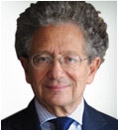Russia: The Sham Society
 Writing for Project Syndicate, Dominique Moisi (pictured, left), a founder and Senior Advisor at Ifri (French Institute for International Relations) and currently a Professor at the College of Europe in Natolin, Warsaw, exposes the charade that is modern Russia:
Writing for Project Syndicate, Dominique Moisi (pictured, left), a founder and Senior Advisor at Ifri (French Institute for International Relations) and currently a Professor at the College of Europe in Natolin, Warsaw, exposes the charade that is modern Russia:
Russia is literally buying its way back into the international system as a preeminent actor, one that is regaining power and clout by replacing nuclear weapons with oil and gas and substituting greed for fear. The balance of terror of the Soviet era has given way to unilateral energy dependency in favor of Russia. With their enormous cash flow, Russian billionaires are buying sumptuous properties all over the world, and Russia is buying prominent Germans like the former Chancellor, Gerhard Schroeder, if not the support of Germany as such.
Whatever the enormous differences that may separate them, post-communist Russia and fundamentalist Iran have much in common. Energy wealth gives them a sense of unique opportunity, the conviction that time is playing in their favor, and that they can now redress the humiliations they have suffered from the outside world. It is as if they were combining the Arab/Islamic world’s culture of humiliation and Asia’s culture of hope. Both are marked by a defiant nationalism, and both feel irresistible, all the more so because they sense that the United States is in decline as a result of the quagmire in Iraq, if not in Afghanistan as well.
Of course, the differences between Russia and Iran are enormous. The Iranian regime is highly ideological and animated by an open passion to destroy Israel. It does not enjoy the massive backing of its society, except when it comes to national pride and the quest for nuclear status.
Russia’s regime, by contrast, is animated by money, not ideology. In its quest to rebuild Russia’s geopolitical power and influence, Presdient Vladimir Putin has the support of the immense majority of the population. His motto, “Get rich and keep quiet,” sounds like Guizot’s priorities in mid-nineteenth century France, even if it is “seasoned” with a strong touch of imperial pride. As long as the oil money keeps flowing, most Russians will express no nostalgia for the democratic opening of the Yeltsin years, with its accompanying combination of chaos, corruption, international weakness, and disrespect for the state.
Are Russians so different from us in the western democratic world, or is democracy a luxury that only old, stable, prosperous, and satisfied societies can afford? In their quest for post-Soviet stability, Russians seem to have found reassurance in Putin. He does not match Peter the Great in physical stature, but he has proven to be a gifted politician, capable of grasping, then controlling, the mood of the Russian people.
For a majority of Russian citizens, economic prosperity and televised entertainment have become the modern equivalent of the panem et circenses formula of Roman times. The war in Chechnya may contribute to the moral corruption of Russia as a whole, to its frightening descent into a culture of violence. But it is also feeding a patriotic emotion – a popular longing for the restoration of Russia’s imperial status and prestige – that Putin’s regime has shrewdly exploited.
Meanwhile, ordinary Russians have gained little. The multiplication of assassinations of political opponents and economic rivals, the mafia practice of contract murders, cannot be seen as signs of a regained stability. Nor can the Putin regime’s manipulation of popular xenophobia against citizens of the former Soviet empire, such as Georgians.
Russia may have recovered its status as a strong power, but is it a respected, or even a happy one? Russia is rich, but Russians, at least most of them, remain poor, with a life expectancy that is closer to Africa than to Western Europe. Eventually, they will have to recognize that modern nations cannot live by power alone.


















No comments:
Post a Comment